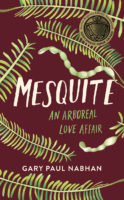 This excerpt is from Gary Paul Nabhan’s book Mesquite: An Arboreal Love Affair (Chelsea Green, 2018) and is printed with permission from the publisher.
This excerpt is from Gary Paul Nabhan’s book Mesquite: An Arboreal Love Affair (Chelsea Green, 2018) and is printed with permission from the publisher.
Arboreality
I am here to convince you that you may have never fully seen, smelled, heard, tasted, or been touched by a tree. In particular, I humbly submit that you and I have yet to fully fathom what a tree can be . . . or at least, what a mesquite tree can be to us. If we can concede that this may be true, there is the very real possibility that some tree can become a beacon for each of us, a luminous life to guide us on our wayward journeys. It can shine a light on how we should live our lives.
Now, don’t get me wrong: I am not putting down your or any-one else’s observational skills, intellectual acuity, or affection for a species other than our own. Indeed, you and other folks I know may have deeply studied a tree’s shape, sampled its fruits, measured its yields, or admired its colors and textures and flavors.
But few of us have come to grips with the many nuances of what it means to be a tree. There are so many unexplored dimensions, hidden attractions, and intangible values associated with the Woody Ones of this Wild and Woolly World. This is especially true when we consider what the reality of trees might be like in the “deep-state,” or what forester Peter Wohlleben calls life’s lower story:
We only know a tiny fraction of what there is to know about the complex life that busies itself under our feet. Up to half the biomass of a forest is hidden in this lower story. Most life-forms that bustle around here cannot be seen by the naked eye.
That is why I fear and fret that we have grasped no more than the most superficial aspects of arboreality, the experience of being a tree as it truly makes sense of this world around us. A tree is not just another pretty face. It is a sentient being of consummate poise, sessile grace, and impeccable instincts. It has the capacity to care for us, to love. We might do well to become more like these towering, flowering kin of ours.
I do not pretend to have been any more cognizant of this fact over most of my life than you have been over yours. In fact, I am embarrassed to say that it wasn’t until quite recently that my own staid manner of viewing trees was forever shattered as a result of a mishap that shifted my perception. That psychic shattering was what prompted me to write on the wood pulp that you hold in your hands or the more ethereal stuff you hold in your digits.
I don’t mean to sound confessional, but there’s nothing to brag about with regard to what precipitated my breakdown.
Not long ago, I was thrown off-kilter and suddenly brought to my knees by a bout of dizziness and nausea. I could not immediately diagnose whether it was a case of vertigo, of influenza, of the sixty- seven-year itch, of the great political malaise that was afflicting much of America, or of an unprecedented rupture of my former identity.
This illness ravaged me while I was wandering through one of the great hyper-arid landscapes of the Americas—Organ Pipe Cactus National Monument, which stretches out along the US–Mexico border like an iridescent mirror reflecting the essential desert in each of us.
Over several horrifying hours, I could not stand up even for a moment without falling back onto the earth. I could not look up without seeing the world spinning violently around me, and I could not open my mouth without disgorging my innards. And so I slid back against the only thing behind me that would prop me up enough to keep me breathing. Otherwise I would have expired.
As I slumped against some unseen object that steadfastly kept me from sinking farther into the earth, I looked up just long enough to see limbs wildly waving above my head, bending to embrace me.
And then I passed out.
—
When I awakened, I had no immediate recollection of where I was or how I had gotten there.
I felt unspeakably disoriented in every sense.
After a few minutes of feeling completely abandoned by every-one I knew and everything I cared about, I caught a glimpse of the only clue in sight that might reorient me to my whereabouts, what-abouts, and who-abouts.
Next to me—under my left elbow, in fact—was a small metal placard that was stuck into the hard, dry ground on a stainless steel spike. The placard simply said these words:
MESQUITE
Prosopis velutina
I began to entertain possibilities of what this placard might mean for me, to me, and about me.
Was it plausible that I had begun to metamorphose into a mesquite tree?
Might it be that my torso had become thickened and torqued into a somewhat twisted trunk?
Could it be that those limbs I had glanced at were my limbs?
Oddly, I felt drained of all humanity, ambition, and volition. It was as though I had lost my capacity to walk, run, or become mobile by any other means.
And yet, for whatever reason, I no longer feared becoming sessile, which is to say, “rooted in place.” I no longer had any urge to “get away,” to “go it alone,” or to retreat to “someplace else.”
Still, it was not as though I had become paralyzed, as if I were unable to be moved by the beauty of the world. As I glanced upward, I saw those limbs—my limbs?—genuflecting, then reaching upward toward the heavens, with all my leaflets reverberating in rhythm to the slightest stirring of a desert breeze. The leaflets were gradually turning to track the rays of the sun; they folded up close with the first signs of drought; and they opened up again in response to the merest hint of rain.
Whenever phainopeplas landed among the mistletoes attached to my limbs so that they could eat and then defecate the berries of that hemiparasitic growth, my branches bowed with gratitude. Whenever floodwaters reached my roots, I could feel them swelling with pride in their capacity to store moisture. Whenever my blossoms burst open, I felt a pleasurable tingle as bees worked my anthers and pistils, sipped my nectar, and shook my pollen until it burst loose.
I was, for a minute, an hour, or an afternoon, in arboreal rapture.
—
And then, rather unexpectedly, I heard a woman’s voice whispering to me:
“Are you alright?” she inquired.
I could not immediately speak; I moaned, I was in such ecstasy. “Me and the hubby over there . . . well, we’ve been watching you from our wooden bench over yonder for nearly an hour, and we’ve hardly seen you move at all. Are you sick? Or stuck? Or stoned?”
My throat felt choked up with something thick, like sap. I tried to bark out a few words, but I could not be sure that they could be heard:
“Not sick. Not stoned. Sticked. Stuck. Lovestruck. I’ve been kissed by the love bug.”
She looked over her shoulder and waved to her spouse.
“He’s making noise now, honey, but he ain’t making much sense . . . I’m sure he’s alive, but I am not sure he’s kickin’ . . . or that I understand what he’s trying to say . . . or sing . . .”
I tried again with all my might to sound rational, but instead, these few words went warbling out of my mouth:
“I once was lost . . . But now I’m found . . . Was blind, but now . . . I’m tree.”
Of course, rapture seldom lasts forever, but whatever had rather unexpectedly happened to me that day in the desert seems to have rewired my life. My arteries now flow like xylem and phloem; my toes and soul reach deeply into the soil.
—
Like many of you, I had heard at different points in my life how lovers have come to live as one; how saints became one with God; and how hermits gripped by the naturalist’s trance become one with nature.
Although I had fleetingly felt such oneness, I didn’t know exactly how to rekindle those feelings so that their very warmth could and would stay longer within me.
And so I did the only thing I could think to do when facing such a dilemma.
I decided to apprentice myself to a tree.
Not to any tree.
To a mesquite.
I chose to spend a year with mesquite as my guru and guide, my teacher, my preacher, my lifeline, and perhaps as my lover.
The stories that follow are what I learned along the way: how to greet a tree, how to eat a tree’s bounty, how to be sheltered, loved, or healed by a tree, and ultimately, how to be a tree.
—
You too might aspire to participate in one of these pursuits. That is why I am inviting you to come along on this desert journey into arboreality.
You may someday need a change in habit and habitat as much as I did.
Teaser photo credit: By Sue in az – Own work, CC BY-SA 3.0, https://commons.wikimedia.org/w/index.php?curid=1930112





